情态动词and主谓一致
- 格式:doc
- 大小:87.50 KB
- 文档页数:8
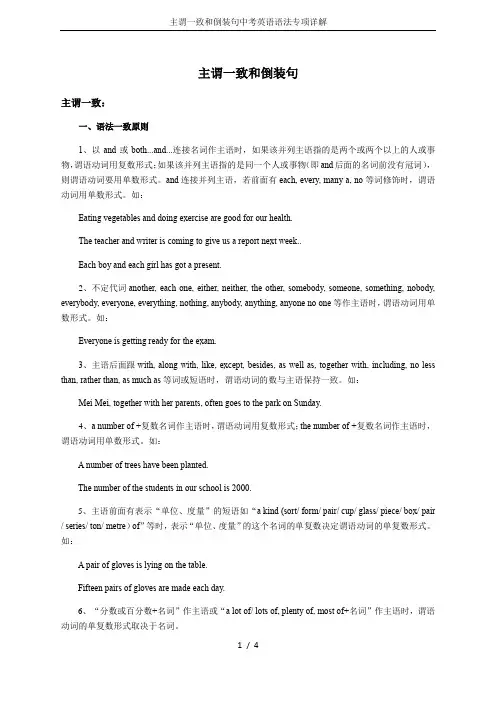
主谓一致和倒装句主谓一致:一、语法一致原则1、以and或both...and...连接名词作主语时,如果该并列主语指的是两个或两个以上的人或事物,谓语动词用复数形式;如果该并列主语指的是同一个人或事物(即and后面的名词前没有冠词),则谓语动词要用单数形式。
and连接并列主语,若前面有each, every, many a, no等词修饰时,谓语动词用单数形式。
如:Eating vegetables and doing exercise are good for our health.The teacher and writer is coming to give us a report next week..Each boy and each girl has got a present.2、不定代词another, each one, either, neither, the other, somebody, someone, something, nobody, everybody, everyone, everything, nothing, anybody, anything, anyone no one等作主语时,谓语动词用单数形式。
如:Everyone is getting ready for the exam.3、主语后面跟with, along with, like, except, besides, as well as, together with, including, no less than, rather than, as much as等词或短语时,谓语动词的数与主语保持一致。
如:Mei Mei, together with her parents, often goes to the park on Sunday.4、a number of +复数名词作主语时,谓语动词用复数形式;the number of +复数名词作主语时,谓语动词用单数形式。
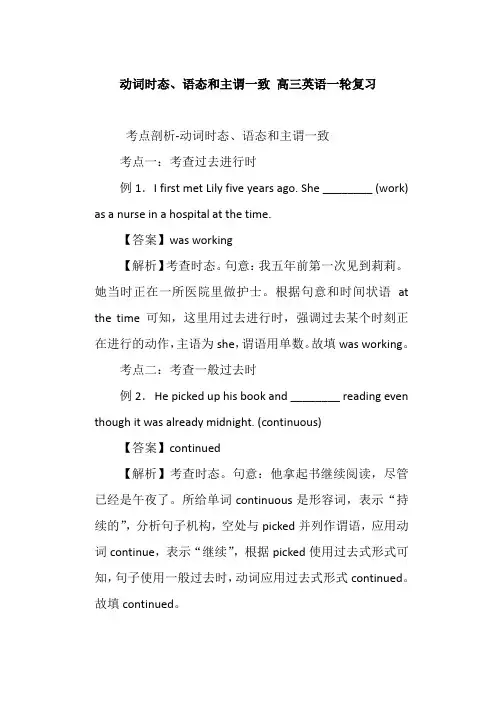
动词时态、语态和主谓一致高三英语一轮复习考点剖析-动词时态、语态和主谓一致考点一:考查过去进行时例1.I first met Lily five years ago. She ________ (work) as a nurse in a hospital at the time.【答案】was working【解析】考查时态。
句意:我五年前第一次见到莉莉。
她当时正在一所医院里做护士。
根据句意和时间状语at the time 可知,这里用过去进行时,强调过去某个时刻正在进行的动作,主语为she,谓语用单数。
故填was working。
考点二:考查一般过去时例2.He picked up his book and ________ reading even though it was already midnight. (continuous)【答案】continued【解析】考查时态。
句意:他拿起书继续阅读,尽管已经是午夜了。
所给单词continuous是形容词,表示“持续的”,分析句子机构,空处与picked并列作谓语,应用动词continue,表示“继续”,根据picked使用过去式形式可知,句子使用一般过去时,动词应用过去式形式continued。
故填continued。
考点三:考查现在进行时例3.—Hi, Jessy. Why are you going to work on foot today?—Well, my car ________. (repair)【答案】is being repaired【解析】考查时态和语态。
句意:——你好,杰西。
你今天为什么要步行去上班?——嗯,我的车正在修理。
根据句意提到步行上班可知,此处表示:车在修理中,时态用现在进行时,主语my car与repair(修理)之间为被动关系,所以用现在进行时的被动语态。
主语my car为单数,be动词用is。
考点四:考查现在完成时例4.The city ________ (recognize) as the musical capital of Europe since the 16th century, home to the likes of Mozart and Beethoven.【答案】has been recognized【解析】考查时态语态。
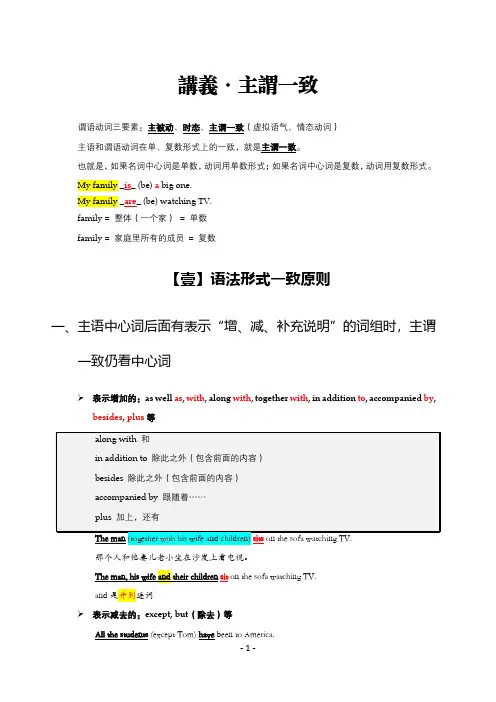
讲义·主谓一致谓语动词三要素:主被动、时态、主谓一致(虚拟语气、情态动词)主语和谓语动词在单、复数形式上的一致,就是主谓一致。
也就是,如果名词中心词是单数,动词用单数形式;如果名词中心词是复数,动词用复数形式。
My family _is_ (be) a big one.My family _are_ (be) watching TV.family = 整体(一个家)= 单数family = 家庭里所有的成员= 复数【壹】语法形式一致原则一、主语中心词后面有表示“增、减、补充说明”的词组时,主谓一致仍看中心词表示增加的:as well as, with, along with, together with, in addition to, accompanied by, besides, plus等along with 和in addition to 除此之外(包含前面的内容)besides 除此之外(包含前面的内容)accompanied by 跟随着……plus 加上,还有The man (together with his wife and children) sits on the sofa watching TV.那个人和他妻儿老小坐在沙发上看电视。
The man, his wife and their children sit on the sofa watching TV.and是并列连词表示减去的:except, but(除去)等All the students (except Tom) have been to America.除汤姆外,其他学生都去过美国。
I want nobody but you.表示补充说明的:including, rather than, like(像), such as等The text book, plus its reference books, is well designed.这本教材,还有参考书,设计的都很好。
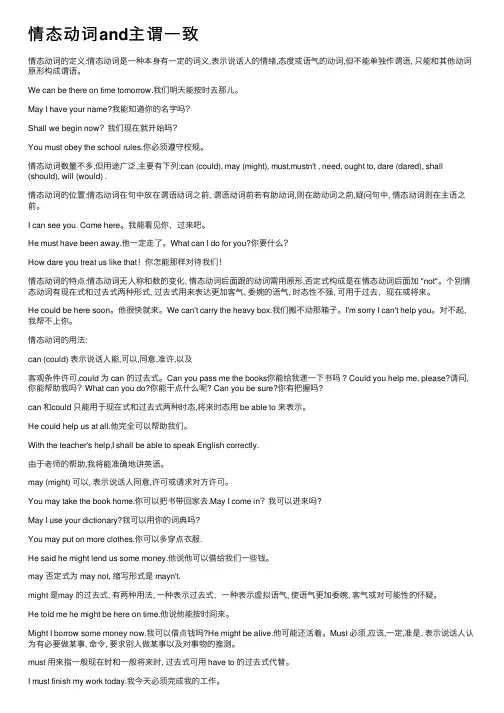
情态动词and主谓⼀致情态动词的定义:情态动词是⼀种本⾝有⼀定的词义,表⽰说话⼈的情绪,态度或语⽓的动词,但不能单独作谓语, 只能和其他动词原形构成谓语。
We can be there on time tomorrow.我们明天能按时去那⼉。
May I have your name?我能知道你的名字吗?Shall we begin now?我们现在就开始吗?You must obey the school rules.你必须遵守校规。
情态动词数量不多,但⽤途⼴泛,主要有下列:can (could), may (might), must,mustn't , need, ought to, dare (dared), shall (should), will (would) .情态动词的位置:情态动词在句中放在谓语动词之前, 谓语动词前若有助动词,则在助动词之前,疑问句中, 情态动词则在主语之前。
I can see you. Come here。
我能看见你,过来吧。
He must have been away.他⼀定⾛了。
What can I do for you?你要什么?How dare you treat us like that!你怎能那样对待我们!情态动词的特点:情态动词⽆⼈称和数的变化, 情态动词后⾯跟的动词需⽤原形,否定式构成是在情态动词后⾯加 "not"。
个别情态动词有现在式和过去式两种形式, 过去式⽤来表达更加客⽓, 委婉的语⽓, 时态性不强, 可⽤于过去,现在或将来。
He could be here soon。
他很快就来。
We can't carry the heavy box.我们搬不动那箱⼦。
I'm sorry I can't help you。
对不起,我帮不上你。
情态动词的⽤法:can (could) 表⽰说话⼈能,可以,同意,准许,以及客观条件许可,could 为 can 的过去式。
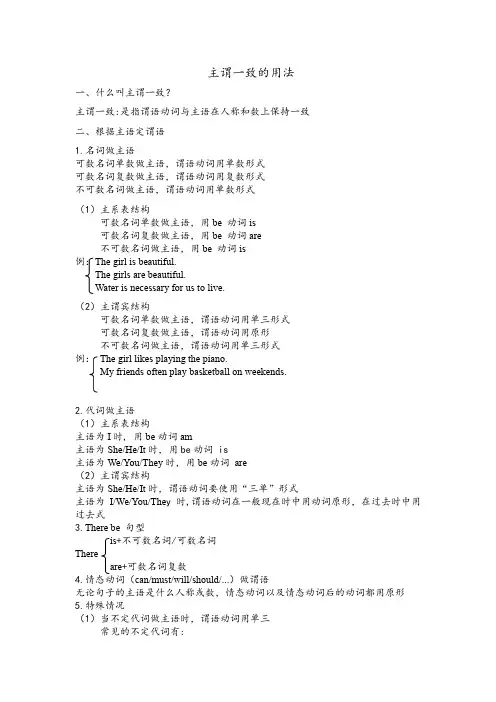
主谓一致的用法一、什么叫主谓一致?主谓一致:是指谓语动词与主语在人称和数上保持一致二、根据主语定谓语1.名词做主语可数名词单数做主语,谓语动词用单数形式可数名词复数做主语,谓语动词用复数形式不可数名词做主语,谓语动词用单数形式(1)主系表结构可数名词单数做主语,用be动词is可数名词复数做主语,用be动词are不可数名词做主语,用be动词is例:The girl is beautiful.The girls are beautiful.Water is necessary for us to live.(2)主谓宾结构可数名词单数做主语,谓语动词用单三形式可数名词复数做主语,谓语动词用原形不可数名词做主语,谓语动词用单三形式例:The girl likes playing the piano.My friends often play basketball on weekends.2.代词做主语(1)主系表结构主语为I时, 用be动词am主语为She/He/It时,用be动词 is主语为We/You/They时,用be动词are(2)主谓宾结构主语为She/He/It时,谓语动词要使用“三单”形式主语为I/We/You/The y时,谓语动词在一般现在时中用动词原形,在过去时中用过去式3.There be句型is+不可数名词/可数名词Thereare+可数名词复数4.情态动词(can/must/will/should/...)做谓语无论句子的主语是什么人称或数,情态动词以及情态动词后的动词都用原形5.特殊情况(1)当不定代词做主语时,谓语动词用单三常见的不定代词有:everyone/anyone/no one/someone/something/anything/everything/nothing(2)当主语是pants/trousers/shoes等复数名词时,谓语动词用复数;但若前面加上单数量词时,谓语动词用单数。

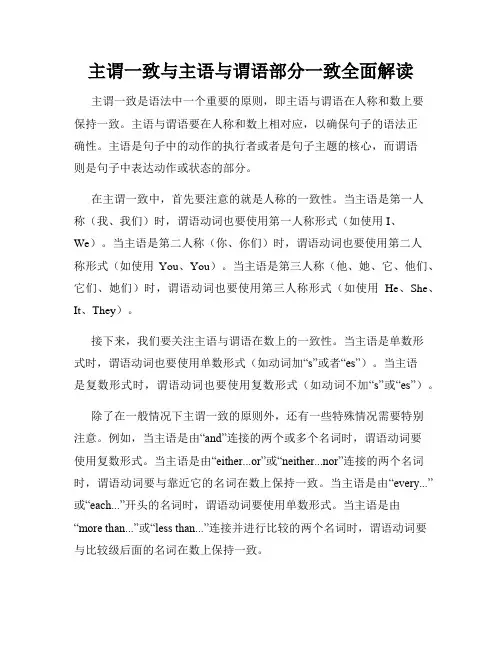
主谓一致与主语与谓语部分一致全面解读主谓一致是语法中一个重要的原则,即主语与谓语在人称和数上要保持一致。
主语与谓语要在人称和数上相对应,以确保句子的语法正确性。
主语是句子中的动作的执行者或者是句子主题的核心,而谓语则是句子中表达动作或状态的部分。
在主谓一致中,首先要注意的就是人称的一致性。
当主语是第一人称(我、我们)时,谓语动词也要使用第一人称形式(如使用I、We)。
当主语是第二人称(你、你们)时,谓语动词也要使用第二人称形式(如使用You、You)。
当主语是第三人称(他、她、它、他们、它们、她们)时,谓语动词也要使用第三人称形式(如使用He、She、It、They)。
接下来,我们要关注主语与谓语在数上的一致性。
当主语是单数形式时,谓语动词也要使用单数形式(如动词加“s”或者“es”)。
当主语是复数形式时,谓语动词也要使用复数形式(如动词不加“s”或“es”)。
除了在一般情况下主谓一致的原则外,还有一些特殊情况需要特别注意。
例如,当主语是由“and”连接的两个或多个名词时,谓语动词要使用复数形式。
当主语是由“either...or”或“neither...nor”连接的两个名词时,谓语动词要与靠近它的名词在数上保持一致。
当主语是由“every...”或“each...”开头的名词时,谓语动词要使用单数形式。
当主语是由“more than...”或“less than...”连接并进行比较的两个名词时,谓语动词要与比较级后面的名词在数上保持一致。
总的来说,主谓一致在英语语法中是一个非常基本的规则。
遵循这个规则能够使句子更加流畅、准确,并且避免语法错误的出现。
要注意主语与谓语在人称和数上的一致性,并特别留意那些特殊情况下的一致性规则。
主语与谓语部分一致也是我们解读句子时需要注意的一个方面。
主语与谓语部分一致要求句子中除了主语与谓语的人称和数要保持一致外,还要求这两个部分在时态、语态等方面也要保持一致。
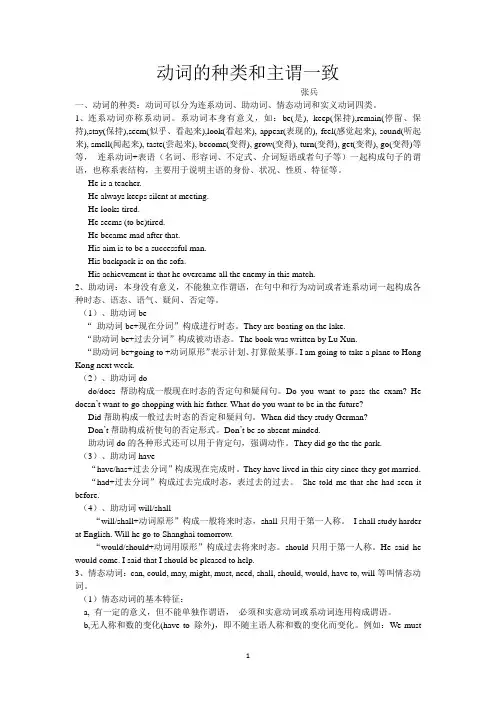
动词的种类和主谓一致张兵一、动词的种类:动词可以分为连系动词、助动词、情态动词和实义动词四类。
1、连系动词亦称系动词。
系动词本身有意义,如:be(是), keep(保持),remain(停留、保持),stay(保持),seem(似乎、看起来),look(看起来), appear(表现的), feel(感觉起来), sound(听起来), smell(闻起来), taste(尝起来), become(变得), grow(变得), turn(变得), get(变得), go(变得)等等,连系动词+表语(名词、形容词、不定式、介词短语或者句子等)一起构成句子的谓语,也称系表结构,主要用于说明主语的身份、状况、性质、特征等。
He is a teacher.He always keeps silent at meeting.He looks tired.He seems (to be)tired.He became mad after that.His aim is to be a successful man.His backpack is on the sofa.His achievement is that he overcame all the enemy in this match.2、助动词:本身没有意义,不能独立作谓语,在句中和行为动词或者连系动词一起构成各种时态、语态、语气、疑问、否定等。
(1)、助动词be“助动词be+现在分词”构成进行时态。
They are boating on the lake.“助动词be+过去分词”构成被动语态。
The book was written by Lu Xun.“助动词be+going to +动词原形”表示计划、打算做某事。
I am going to take a plane to Hong Kong next week.(2)、助动词dodo/does 帮助构成一般现在时态的否定句和疑问句。
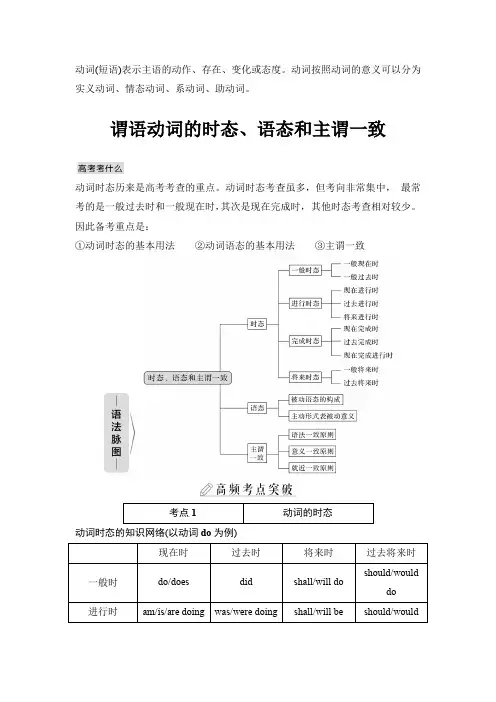
动词(短语)表示主语的动作、存在、变化或态度。
动词按照动词的意义可以分为实义动词、情态动词、系动词、助动词。
谓语动词的时态、语态和主谓一致动词时态历来是高考考查的重点。
动词时态考查虽多,但考向非常集中,最常考的是一般过去时和一般现在时,其次是现在完成时,其他时态考查相对较少。
因此备考重点是:①动词时态的基本用法②动词语态的基本用法③主谓一致动词时态的知识网络(以动词do为例)1.一般时态(1)一般现在时①表示经常或习惯性的动作,多用动作动词,且常与表频率的时间状语连用。
We have meals three times a day.我们一日吃三餐。
②表示客观真理、科学事实及自然现象。
The sun sets in the west.太阳从西方落下。
③在时间、条件状语从句中常用一般现在时代替一般将来时。
I’ll write to her when I have time.有时间我会写信给她。
(2)一般过去时①表示过去发生的一次性或习惯性动作或状态。
We often played basketball together.我们(过去)经常在一起打篮球。
②时间、条件、让步状语从句中,若主句用了过去将来时,从句常用一般过去时。
He said he would tell her the news as soon as he met her.他说他一见到她就把这个消息告诉她。
单句语法填空①The 80,000 objects collected by Sir Hans Sloane, for example, formed (form) the core collection of the British Museum which/that opened in 1759.(2020·新高考卷Ⅰ语法填空)②The unmanned Chang’e-4 probe (探测器)—the name was inspired by an ancient Chinese moon goddess—touched (touch) down last week in the South Pole-Aitken basin.(2020·全国卷Ⅰ语法填空)③When/As he asked the villagers on the banks of the river where he could find the legendary (传奇的) artist, they smiled and pointed (point) down the river.(2020·全国卷Ⅲ语法填空)④New methods meant__(mean)that fewer people worked in farming.(2020·浙江卷语法填空)⑤While running regularly can’t make you live forever,the review says it is(be) more effective at lengthening life than walking,cycling or swimming.(2018·全国卷Ⅰ语法填空)⑥Sarah says,“My dad thinks I should take the offer now.But at the moment,school comes (come) first.I don’t want to get too absorbed in modeling.”(全国卷Ⅲ语法填空)2.进行时态(1)现在进行时(am/is/are+现在分词)①表示说话时正在进行或发生的动作,也可表示现阶段正在进行的动作或存在的状态。
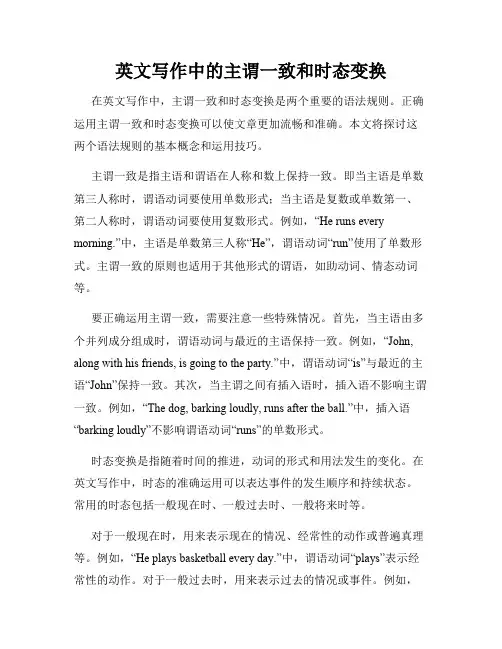
英文写作中的主谓一致和时态变换在英文写作中,主谓一致和时态变换是两个重要的语法规则。
正确运用主谓一致和时态变换可以使文章更加流畅和准确。
本文将探讨这两个语法规则的基本概念和运用技巧。
主谓一致是指主语和谓语在人称和数上保持一致。
即当主语是单数第三人称时,谓语动词要使用单数形式;当主语是复数或单数第一、第二人称时,谓语动词要使用复数形式。
例如,“He runs every morning.”中,主语是单数第三人称“He”,谓语动词“run”使用了单数形式。
主谓一致的原则也适用于其他形式的谓语,如助动词、情态动词等。
要正确运用主谓一致,需要注意一些特殊情况。
首先,当主语由多个并列成分组成时,谓语动词与最近的主语保持一致。
例如,“John, along with his friends, is going to the party.”中,谓语动词“is”与最近的主语“John”保持一致。
其次,当主谓之间有插入语时,插入语不影响主谓一致。
例如,“The dog, barking loudly, runs after the ball.”中,插入语“barking loudly”不影响谓语动词“runs”的单数形式。
时态变换是指随着时间的推进,动词的形式和用法发生的变化。
在英文写作中,时态的准确运用可以表达事件的发生顺序和持续状态。
常用的时态包括一般现在时、一般过去时、一般将来时等。
对于一般现在时,用来表示现在的情况、经常性的动作或普遍真理等。
例如,“He plays basketball every day.”中,谓语动词“plays”表示经常性的动作。
对于一般过去时,用来表示过去的情况或事件。
例如,“She studied hard for the exam.”中,谓语动词“studied”表示过去的动作。
对于一般将来时,用来表示将来的情况或计划。
例如,“I will go shopping tomorrow.”中,谓语动词“will go”表示将来的行为。
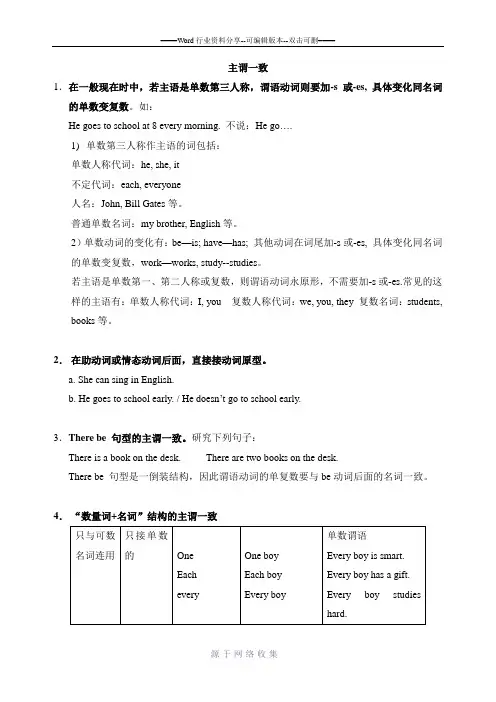
主谓一致1.在一般现在时中,若主语是单数第三人称,谓语动词则要加-s或-es, 具体变化同名词的单数变复数。
如:He goes to school at 8 every morning. 不说:He go….1)单数第三人称作主语的词包括:单数人称代词:he, she, it不定代词:each, everyone人名:John, Bill Gates等。
普通单数名词:my brother, English等。
2)单数动词的变化有:be—is; have—has; 其他动词在词尾加-s或-es, 具体变化同名词的单数变复数,work—works, study--studies。
若主语是单数第一、第二人称或复数,则谓语动词永原形,不需要加-s或-es.常见的这样的主语有:单数人称代词:I, you 复数人称代词:we, you, they 复数名词:students, books等。
2.在助动词或情态动词后面,直接接动词原型。
a. She can sing in English.b. He goes to school early. / He doesn’t go to school early.3.There be 句型的主谓一致。
研究下列句子:There is a book on the desk. There are two books on the desk.There be 句型是一倒装结构,因此谓语动词的单复数要与be动词后面的名词一致。
4.“数量词+名词”结构的主谓一致在上述数量词中,有些还可以接of 短语连用。
具体用法如下:5.单数形式的名词作主语与谓语动词形式的关系一般来说,单数名词作主语,谓语动词用单数形式,这个符合英语中的语法上一致原则。
但此种情况也有例外。
现在详细归纳如下:1)Many a +名词单数,虽为复数概念,但谓语用单数。
a.There is many an error that he has neglected.b.Many a man and (many a) woman has wished that he or she had had a bettereducation. (Many men and women have….)2)More than one+可数名词单数,是复数概念,但谓语用单数。
情态动词、主谓一致、倒装句------江苏省海门中学李俊一、情态动词助动词与情态动词最主要的区别之一是,助动词本身没有词义,而情态动词则有自己的词义,能表示说话人对有关动作或状态的看法,或表示主观设想。
例:What have you been doing since? (构成完成进行体,本身无词义)I am afraid I must be going. (一定要)You may have read some account of the matter. (或许已经)除此之外,情态动词还有如下词法和句法特征:1) 除ought和used以外,其他情态动词后面只能接不带to的不定式。
如果我们把oughtto和used to看作是固定词组的话,那么,所有情态动词无一例外地只能接不带to的不定式。
例:We used to grow beautiful roses.I asked if he would come and repair my television set.2)情态动词在限定动词词组中总是位居第一。
例:They need not have been punished so severely.3)情态动词没有人称和数的变化。
例:She dare not say what she thinks.4)情态动词没有非限定形式,即没有不定式、-ing分词和-ed分词形式。
例:Still, she needn’t have run away.5)情态动词的“时”的形式并不是时间区别的主要标志。
在不少场合,情态动词的现在时和过去时形式都可以表示现在、过去或将来时间。
例:Would you mind very much if I ask you to do something? She told him he ought not to have done it.6)情态动词之间是相互排斥的,即在一个限定动词词组中只能出现一个情态动词,但有时却可以与助动词have和be连用。
主谓一致和倒装【用法讲解】考试要求:从学英语开始就涉及主语和谓语的一致性,是英语学习及考查的基础,从单项选择到书面表达,都可能涉及到主谓一致的问题,是中考试卷必考题目。
主谓一致就是句子的谓语动词形式在人称和数上必须和句子的主语保持一致,叫主谓一致。
这种关系一般要遵循三个原则:语法上一致的原则;意义上一致的原则和就近一致的原则。
倒装句因为与汉语语言习惯的不同和较多的句型结构而成为初中英语的难点,虽然初中英语涉及到的倒装句型不算太多,在中考试卷中也总有一定的比例,尤其在阅读理解和完形填空中对上下文的理解会有很大的影响,因此也是中考复习的重点。
1. 语法一致原则谓语和主语通常从语法形式上取得一致,主语为单数形式,谓语动词也用单数形式;主语为复数形式,谓语动词也为复数形式。
如:The boy is clever enough to study maths well. 这个男孩够聪明,可以把数学学好。
Everybody in my class tries to do well in English. 我们班每个人都努力学好英语。
(1)下列情况谓语动词只能用单数:1)不可数名词或可数名词单数作主语,谓语动词用单数形式。
如:Water is very important to the trees. 水对树来说非常重要。
2)动词不定式或者动名词短语作主语时,谓语动词用单数形式。
如:To improve your English is the most important work.提高你的英语是最重要的工作。
Watching TV too much is bad for your eyes.看电视太多对你的眼睛有害。
3)不定代词each,one,another,something,somebody,nothing,nobody,everyone,everything,anyone,anything等作主语时,谓语动词用单数形式。
讲义·主谓一致谓语动词三要素:主被动、时态、主谓一致(虚拟语气、情态动词)主语和谓语动词在单、复数形式上的一致,就是主谓一致。
也就是,如果名词中心词是单数,动词用单数形式;如果名词中心词是复数,动词用复数形式。
My family _is_ (be) a big one.My family _are_ (be) watching TV.family = 整体(一个家)= 单数family = 家庭里所有的成员= 复数【壹】语法形式一致原则一、主语中心词后面有表示“增、减、补充说明”的词组时,主谓一致仍看中心词表示增加的:as well as, with, along with, together with, in addition to, accompanied by, besides, plus等along with 和in addition to 除此之外(包含前面的内容)besides 除此之外(包含前面的内容)accompanied by 跟随着……plus 加上,还有The man (together with his wife and children) sits on the sofa watching TV.那个人和他妻儿老小坐在沙发上看电视。
The man, his wife and their children sit on the sofa watching TV.and是并列连词表示减去的:except, but(除去)等All the students (except Tom) have been to America.除汤姆外,其他学生都去过美国。
I want nobody but you.表示补充说明的:including, rather than, like(像), such as等The text book, plus its reference books, is well designed.这本教材,还有参考书,设计的都很好。
高中英语知识点归纳主谓一致和主谓语序的关系高中英语知识点归纳:主谓一致和主谓语序的关系在学习英语语法的过程中,我们经常会遇到主谓一致和主谓语序这两个概念。
正确理解和运用这两个概念将有助于我们提高英语写作和阅读的能力。
本文将对主谓一致和主谓语序的关系进行归纳和分析。
1.主谓一致主谓一致是指主语和谓语在人称和数上要保持一致。
如果主语是单数形式,谓语动词要用单数形式;如果主语是复数形式,则谓语动词要用复数形式。
一般情况下,主谓一致很容易判断,但有些特殊情况需要我们格外注意。
1.1 不定代词作主语不定代词(如somebody,anything等)虽然在形式上是单数,但在意义上可以表示复数概念。
当不定代词作为主语时,谓语动词要用复数形式。
例如:Somebody are waiting for you.(正确)Somebody is waiting for you.(错误)1.2 并列主语并列主语指的是句子中有两个或更多的主语,谓语动词要与最靠近它的主语在人称和数上保持一致。
例如:Mary and John are good friends.(正确)Mary and John is good friends.(错误)1.3 there be句型当句子以“There is/are”开头时,谓语动词的单复数形式取决于后面紧跟的名词的单复数形式。
例如:There is a book on the table.(正确)There are three books on the table.(正确)2.主谓语序主谓语序是英语中的基本语法规则,即主语在传统的陈述句中位于谓语之前,这也是大部分情况下的语序。
例如:She is reading a book.(正确)Is she reading a book?(正确)但在疑问句、否定句、以及强调句中,主谓语序会发生改变。
2.1 疑问句在疑问句中,谓语动词要位于主语之前。
对于一般疑问句,我们需要在句子开头使用助动词或情态动词来引导。
主谓一致、强调句和倒装句、情态动词和虚拟语气讲解以及习题详细解析主谓一致主谓一致是指一个句子的主语和谓语动词保持人称与数的一致关系。
有些句子不易直接看出主语的单复数,需仔细推敲。
处理主谓一致要注意语法一致,意义上一致和就近一致。
一、语法上的一致一个句子的主语是单数时,谓语动词也应是单数形式,主语是复数,谓语动词也用复数形式。
例如:Learning English is very important.学习英语是很重要的。
The girl together with her two sisters has left for Nanjing.Both Bob and Tom are my friends.但如果并列的主语指的是同一个人,同一类物,谓语动词要用单数形式。
例如:A singer and dancer is going to attend our meeting.由and连接的并列单数主语前,如果分别有each, every等修饰时,谓语要用单数。
例如:Every boy and every girl was given a present.Each word and each phrase in the dictionary is important.二、意义上的一致主语形式是单数,但意义为复数,谓语动词根据意义要用复数;反之主语形式为复数,但意义为单数,谓语动词也用单数。
如表示一笔钱,一段时间,一定重量时,这些单位虽是复数形式,但谓语动词是单数形式。
例如:It seems to me that five years is so short a time.Two hundred dollars was spent on the books.有些集体名词,如family, group, class等作主语时,作为整体看待,谓语动词要用单数,就其中一个个成员而言,谓语要用复数。
例如:My family is a happy one.My family are watching TV.三、就近一致出现几个主语时,谓语动词的人称单复数须和最近的主语保持一致。
知识清单:常考知识点:一:语法一致原则:1.用and和both连接主语的时候,谓语动词用复数形式。
2.不定代词 either, neither, each one, the other, another, anybody, anyone, anything, someone, somebody, something, everyone,everybody, everything, nobody, no one, nothing等作主语的时候,谓语动词用单数形式。
3.由each, each……and, each…, every, every…and, every…作主语时,谓语动词用单数形式。
4.主语后面接有:with, along with, together with, as well as, no less than, more than, including, besides, like, except, but等词或短语时,谓语动词的单复数由主语单复数形式决定。
5.“a number of +名词复数”作主语时,谓语动词用复数形式;“the number of + 名词复数”作主语时,谓语动词用单数形式。
6.“a lot of (lots of, plenty of, a pile of, piles of, most of)+ 名词”和“百分数或分数+ 名词”等作主语时,谓语动词的单复数形式取决于名词;若是不可数名词则用谓语动词单数形式;若是可数名词复数,则用谓语动词复数形式。
7.由“a pair (a kind, a series…)+ of + 复数名词”作主语时,谓语动词用单数形式;“pairs(kinds…)+ of + 复数名词”作主语时,位于动词用复数形式。
8.某些只有复数形式的名词 (如clothes, trousers, shorts, pants, shoes, gloves…)作主语时,谓语动词用复数形式。
情态动词的定义:情态动词是一种本身有一定的词义,表示说话人的情绪,态度或语气的动词,但不能单独作谓语, 只能和其他动词原形构成谓语。
We can be there on time tomorrow.我们明天能按时去那儿。
May I have your name?我能知道你的名字吗?Shall we begin now?我们现在就开始吗?You must obey the school rules.你必须遵守校规。
情态动词数量不多,但用途广泛,主要有下列:can (could), may (might), must,mustn't , need, ought to, dare (dared), shall (should), will (would) .情态动词的位置:情态动词在句中放在谓语动词之前, 谓语动词前若有助动词,则在助动词之前,疑问句中, 情态动词则在主语之前。
I can see you. Come here。
我能看见你,过来吧。
He must have been away.他一定走了。
What can I do for you?你要什么?How dare you treat us like that!你怎能那样对待我们!情态动词的特点:情态动词无人称和数的变化, 情态动词后面跟的动词需用原形,否定式构成是在情态动词后面加 "not"。
个别情态动词有现在式和过去式两种形式, 过去式用来表达更加客气, 委婉的语气, 时态性不强, 可用于过去,现在或将来。
He could be here soon。
他很快就来。
We can't carry the heavy box.我们搬不动那箱子。
I'm sorry I can't help you。
对不起,我帮不上你。
情态动词的用法:can (could) 表示说话人能,可以,同意,准许,以及客观条件许可,could 为 can 的过去式。
Can you pass me the books你能给我递一下书吗 ? Could you help me, please?请问,你能帮助我吗?What can you do?你能干点什么呢? Can you be sure?你有把握吗?can 和could 只能用于现在式和过去式两种时态,将来时态用 be able to 来表示。
He could help us at all.他完全可以帮助我们。
With the teacher's help,I shall be able to speak English correctly.由于老师的帮助,我将能准确地讲英语。
may (might) 可以, 表示说话人同意,许可或请求对方许可。
You may take the book home.你可以把书带回家去.May I come in?我可以进来吗?May I use your dictionary?我可以用你的词典吗?You may put on more clothes.你可以多穿点衣服.He said he might lend us some money.他说他可以借给我们一些钱。
may 否定式为 may not, 缩写形式是 mayn't.might 是may 的过去式, 有两种用法, 一种表示过去式,一种表示虚拟语气, 使语气更加委婉, 客气或对可能性的怀疑。
He told me he might be here on time.他说他能按时间来。
Might I borrow some money now.我可以借点钱吗?He might be alive.他可能还活着。
Must 必须,应该,一定,准是, 表示说话人认为有必要做某事, 命令, 要求别人做某事以及对事物的推测。
must 用来指一般现在时和一般将来时, 过去式可用 have to 的过去式代替。
I must finish my work today.我今天必须完成我的工作。
You mustn't work all the time.你不能老是工作。
Must I return the book tomorrow?我必须明天还书吗?After such a long walk, you must be tired.走了这么长的路,你一定困了。
He must be the man I am looking for.他一定是我要找的人。
He had to go because of somebody's calling him that day.那天他要走是因为有人叫他。
must + have + 过去分词,表示现在对过去事物的推测。
He must have told my parents about it. 他一定把这件事情告诉我父母亲了。
He must have received my letter now. 他现在一定收到我的信了。
It's six o'clock already, we must have been late again.已经六点钟了,我们一定又迟到了。
must 和 have to 的区别: must 表示说话人的主观思想, have to 表示客观需要。
You must do it now.你必需现在就干。
(说话人认为必须现在干)I have to go now. 我得走了。
(客观条件必须现在走)回答must 提问:(1)肯定回答:Yes,----must.(2)否定回答:No,--needn't./No,---don't/doesn't have to.need 需要多用在否定式或疑问句.Need I attend the meeting tomorrow? 我需要明天参加会议吗?You need not hand in the paper this week. 这一周你不必交论文。
need 是一个情态动词, 他的用法完全和其他情态动词一样, 但 need 还可当作实义动词使用, 这时 need 就象其他动词一样,有第三人称,单复数, 后面加带 to 的动词等特性。
I need a bike to go to school. 我上学需要一辆自行车。
Do you need a dictionary?你需要词典吗?She needs a necklace. 她需要一条项链。
needn't + have + 过去分词表示过去做了没必要做的事情。
You needn't have taken it seriously.这件事情你不必太认真。
dare 敢多用在否定或疑问句中。
The little girl dare not speak in public.小女孩不敢在公众面前说话。
Dare you catch the little cat? 你敢抓小猫吗?dare 除用作情态动词外,更多的是当实义动词使用, 用法同实义动词一样,要考虑人称,单复数,时态等。
Do you dare to walk in the dark?你敢黑夜走路吗?He doesn't dare to tell the teacher what happened that day。
他不敢告诉老师那天发生的事。
ought 应当,应该后面跟带有 to 的动词不定式。
You ought to read these books if you want to know how to repair the motorcar. 如果你想知道如何修理汽车,你应该读这些书。
You ought to bring the child here.你应该把孩子带来。
ought + to have done 句型。
指过去动作,表示一件事情该做而未做。
You ought to have been here yesterday. 你昨天就应该来。
ought not to have done 句型。
表示一件不该做的事情却做了。
You ought not to have taken the book out of the reading-room.你不应该把书带出阅览室。
will (would)决心,愿望。
would 为 will 的过去式,可用于各人称。
I'll do my best to catch up with them. 我要尽全力赶上他们。
I'll never do it again, that's the last time. 我再不会做那件事情了,这是最后一次。
He said he would help me. 他说他会帮助我。
will, would用于疑问句表示说话人向对方提出请求或询问,用 would 比 will 更婉转,客气。
It's hot. Will you open the windows?天气太热了,你能打开窗户吗?Will you help me to work it out?你能帮我解这道题吗?Would you like some coffee?给你来点咖啡怎样?Shall, should表示命令,警告,允诺,征求,劝告,建议惊奇。
You should hand in the exercise book.你应该交作业本儿了。
This should be no problem.这应该没问题。
Shall we go now.我们现在可以走了吗? Why should I meet him?为什么我要见他?情态动词练习题Ⅰ. 单项选择(45%)1.I thought you like something to read, so I have brought you some books.A.mayB.mightC.couldD.must2.You to the meeting this afternoon if you have something important to do.A. needn't to comeB. don't need comeC. don't need comingD. needn't come3. He you more help, even though he was very busy.A. might have givenB. might giveC. may have givenD. may give4.─I help you with some shoes, madam?─ Yes, I would like to try on those brown ones.A. WillB. ShouldC. MayD. Must5. The reason why they leave wasn't explained to us.A. hadB. had toC. mustD. might6. I searched for my wallet and it wasn't there. I thought I it at home.A. leftB. have leftC. might have leftD. could have left7. I asleep because it took me a long time to realize that the telephone was ringing.A. could have fallenB. should have fallenC. must have fallenD. mustn't have fallen8. The only thing that really matters to the children is how soon they return to their school.A. canB. mustC. have toD. ought to9. I want to go to the chemist's, but you go with me.A. need notB. must notC. needD. must10. I thought it over, but come to no conclusion.A. canB. couldC. shouldD. would11. What we get seems better than what we have.A. canB. couldC. can'tD. couldn't12.─My goodness! I've just missed the train.─That's too bad. I am sure you it, if you had hurried.A. could have caughtB. had caughtC. would catchD. could catch13. Look! What you've done! You more careful.A. may beB. had toC. should have beenD. would be14. I repeat the question?A. ShallB. WillC. Do you want thatD. Do15. Professor Li, many students want to see you. they wait here or outside!A. DoB. WillC. ShallD. Are16. You read that book if you don't want to.A. haven'tB. can'tC. mustn'tD. needn't17. Johnny, you play with the knife; you hurt yourselfA. won't; can'tB. can't; shouldn'tC. shouldn't; mustD. mustn't; may18. It's nearly seven o'clock. Jack be here at any moment.A. mustB. needC. canD. should19. ─ There were already 5 people in the car, but they managed to take me as well.─ It a comfortable journey.A. can't beB. shouldn't beC. couldn't have beenD. mustn't have been20. Tom ought not to me your secret, but he meant no harm.A. have toldB. tellC. be telling C. having told21. Everyone is here. we start the meeting?A. CanB. MustC. ShouldD. Shall22. I parked my car right here but now it's gone. It .A. must be stolenB. may be stolenC. must have stolenD. must have been stolen23. He the work yesterday, but he didn't.A. must have finishedB. need have finishedC. finishedD. should have finished24. He did not pass the examination. As a good student, he .A. mustn't have failedB. may not have failedC. needn't have failedD. shouldn't have failed25. it be true that Albert passed the test in geography?A. MayB. shouldC. CouldD. would26. You lead a horse to the water but you not make it drink.A. will; canB. may; canC. may; dareD. dare; can27. ─Must we finish the composition in class?─No, you .A. needn'tB. mustn'tC. won'tD. shouldn't28. Her eyes were red. She .A. must cryB. must be criedC. must have been cryingD. may cry29. Mary his letter, otherwise she would have replied before now.A. has receivedB. must receiveC. couldn't have receivedD. shouldn't have received30. I told Sally how to get here, but perhaps I for her.A. had to write it outB. must have written it outC. should have written it outD. ought to write it outⅡ. 用所给动词的适当形式填空(10%)─Hello. Gerry speaking.─Hello, Gerry. It's me John here. Why aren't you here at the meeting?─Well, I'm terribly sorry, but I'm not feeling very well.─Is that all? We thought you might (have) an accident or (forget) the day or something. ─No, I'm sorry. I was sick all night. I think it must (be) the fish I ate last night. ─Well, I think you should at least (phone) Kate and (tell) her you weren't coming to the meeting.─Yes, I suppose I should (do) so. I'm sorry about that. Anyway, I think I'll be able to get in to work tomorrow.─OK, Take care and don't eat any more fish.─I won't. Thanks for calling.─That's all right.Ⅲ. 用would, should, must , have to 填空 (20%)1.─ I have not a raincoat with me.─That's why I wait until the rain stops.2. you be so kind as to keep an eye on my house while I am away?3. It is important that I see him at once.4. the pain return,take one of these pills.5. They didn't dare to leave the train lest they be attacked by wolves.6. He ordered that Tom leave the house at once.7. The last bus has left. We walk home.8. The weather was bad. We wait for two hours at the airport before we took off.9. You come and see us sometime.10.The letter be translated into English.Ⅳ. 把下列句子译成英语 (25%)1.她一定把钥匙丢了.2.他们一定走了,可是应当给我留一个条子呀!3.你本不必要把整个课文都译成汉语.4.我是可能早一些来的,可是我在路上碰到一个朋友.5.下一次你应该更小心些答案Ⅰ. 1.B 2.D 3.A 4. C 5. B 6. C 7. C 8. A 9. A 10. B 11.C 12.A 13.C 14.A 15.C 16.D 17.D 18.D 19.C 20.A 21.D 22.D 23.D 24.D 25. C 26.B 27.A 28.C 29.C 30.CⅡ. have had; forgotten; be; hav;honed; told;have done;Ⅲ. 1. have to 2. Would 3. should 4. Should5. should 6. should7. have to/will have to 8. had to 9. must 10. mustⅣ.1. She must have lost her key.2. The must have left, but they should have left us a note.3. You needn't have translated the whole text into Chinese.4. I could have arrived a little earlier, but I met a friend of mine on the way.5. You should be more careful next time.主谓一致的种类:⑴语法形式上的一致主语为单数形式,谓语动词用单数形式;主语为复数形式,谓语动词为复数形式。